直引变间引
直引变间引
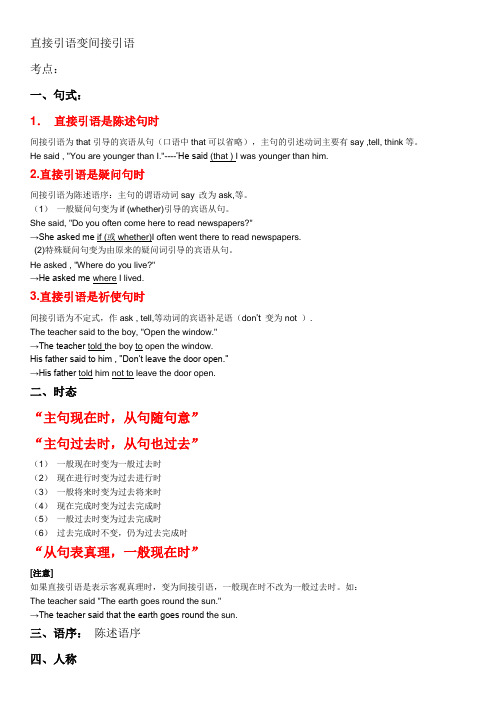
直接引语变间接引语考点:一、句式:1.直接引语是陈述句时间接引语为that引导的宾语从句(口语中that可以省略),主句的引述动词主要有say ,tell, think等。
He said , "You are younger than I."----’He said(that ) I was younger than him.2.直接引语是疑问句时间接引语为陈述语序:主句的谓语动词say 改为ask,等。
(1)一般疑问句变为if (whether)引导的宾语从句。
She said, "Do you often come here to read newspapers?"→She asked me if (或whether)I often went there to read newspapers.(2)特殊疑问句变为由原来的疑问词引导的宾语从句。
He asked , "Where do you live?"→He asked me where I lived.3.直接引语是祈使句时间接引语为不定式,作ask , tell,等动词的宾语补足语(don’t 变为not ).The teacher said to the boy, "Open the window."→The teacher told the boy to open the window.His father said to him , "Don’t leave the door open."→His father told him not to leave the door open.二、时态“主句现在时,从句随句意”“主句过去时,从句也过去”(1)一般现在时变为一般过去时(2)现在进行时变为过去进行时(3)一般将来时变为过去将来时(4)现在完成时变为过去完成时(5)一般过去时变为过去完成时(6)过去完成时不变,仍为过去完成时“从句表真理,一般现在时”[注意]如果直接引语是表示客观真理时,变为间接引语,一般现在时不改为一般过去时。
句式转换(直接引语和间接引语、双重否定)

1、这样肮脏、零乱的地方,不会让人觉得舒服。 2、要奋斗就会有牺牲,这难道不是真理吗? 3、这场比赛不能让祖国再次蒙受屈辱。 4、象桑娜那样品德高尚的人值得赞扬。 5、杭州的西湖难道不像一颗光彩夺目的明珠? 6、为了把祖国建设得更强盛,我们应该努力学 习。 7、作为少先队员应该讲文明,有礼貌。 8、难道打仗就是为了多杀人吗? 9、毒刑拷打算得了什么?死亡也无法叫我开口。 10、实现四个现代化,难道不是全国人民的伟大 历史任务吗?
欧阳海舍身拦惊马的英雄事迹,令我们感动。
1、冬天来了,春天还会远吗? 2、人与山的关系日益密切,怎能不使我们感到 亲切与舒服呢? 3、海边上不是还泛着白色的浪花吗? 4、我们遇到困难,怎么能退缩呢? 5、说出的话难道可以不算数? 6、不好好学习,怎能能取得好成绩呢? 7、那奔驰的列车不是我们祖国奋勇前进的象 征吗? 8、都是你自己找的,我怎么帮得了你的忙? 9、那浪花所奏的不正是一首欢乐的歌吗? 10、我们怎能忘记老师的谆谆教导? 11、难道打仗就是为了多杀人吗?
6、燕子飞过大海,肯定非常辛苦、艰难。 7、爹妈都不在家,只好自己动手丰衣足食了。 8、在共产党面前,什么困难都能克服。 9、这部电影使我感动得流泪。 10、黑熊躲进大树洞里。
6、燕子飞过大海,不可能不辛苦、艰难。 7、爹妈都不在家,不得不自己动手丰衣足食了。 8、在共产党面前,没有困难不能克服。 9、这部电影不能不使我感动得流泪。 10、黑熊不得不躲进大树洞里
1、小玲取得的优异成绩正是她勤奋学习的结果。 2、我们不能被困难吓倒。 3、如果我们也能像水滴那样,没有什么事情做不成。 4、十年树木,百年树人.老师的教育之恩,我们终身
难忘。 5、千难万险不能阻挡我们前进的步伐。 6、我们永远不会忘记这比山还高比海还深的情谊。 7、巍峨高山是英雄坚强不屈的精神象征。
直引变间引,被动语态
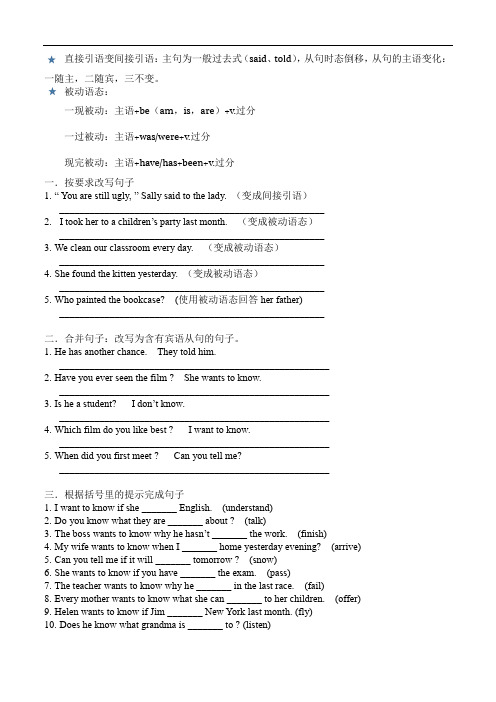
直接引语变间接引语:主句为一般过去式(said、told),从句时态倒移,从句的主语变化:一随主,二随宾,三不变。
被动语态:一现被动:主语+be(am,is,are)+v.过分一过被动:主语+was/were+v.过分现完被动:主语+have/has+been+v.过分一.按要求改写句子1.“ You are still ugly, ” Sally said to the lady. (变成间接引语)_____________________________________________________2.I took her to a children’s party last month. (变成被动语态)_____________________________________________________3.We clean our classroom every day. (变成被动语态)_____________________________________________________4.She found the kitten yesterday. (变成被动语态)_____________________________________________________5.Who painted the bookcase? (使用被动语态回答her father)_____________________________________________________二.合并句子:改写为含有宾语从句的句子。
1.He has another chance. They told him.______________________________________________________2.Have you ever seen the film ? She wants to know.______________________________________________________3.Is he a student? I don’t know.______________________________________________________4.Which film do you like best ? I want to know.______________________________________________________5.When did you first meet ? Can you tell me?______________________________________________________三.根据括号里的提示完成句子1.I want to know if she _______ English. (understand)2.Do you know what they are _______ about ? (talk)3.The boss wants to know why he hasn’t _______ the work. (finish)4.My wife wants to know when I _______ home yesterday evening? (arrive)5.Can you tell me if it will _______ tomorrow ? (snow)6.She wants to know if you have _______ the exam. (pass)7.The teacher wants to know why he _______ in the last race. (fail)8.Every mother wants to know what she can _______ to her children. (offer)9.Helen wants to know if Jim _______ New York last month. (fly)10.Does he know what grandma is _______ to ? (listen)四.选词填空what if there got lazy1.She didn’t say _______ her mother was at home.2.Do you know when Tom _______ up this morning.3.Can you tell me _______ you hear ?4.I want to know if you will be _______ tomorrow.5.His wife wants to know why he is so _______.五、将下列句子变成被动语态1.Tom broke the glass just now.2.He invited me to the party.3.Somebody cleaned the room yesterday.4.They water these flowers every day.5.We have emptied the baskets. ()六、单项选择1.What language in America?A. speakB. spokeC. spokenD. is spoken2.They to clean the classroom yesterday.A. are askedB. were askedC. askedD. Ask3 .This kind of flower must every day.A .water B.be watered C .watered D .watering4 .This kind of bike in Tianjin.A .is madeB .makesC .is makingD .made。
直接引语和间接引语

一、直接引语变间接引语a.陈述句的间接引语直接引语是陈述句,变为间接引语时,在多数情况下都构成一个that引导的宾语从句,引述动词通常是say, tell等。
与此同时,间接引语中的人称、时态和其他方面也要相应有所变化。
b.疑问句的间接引语1.一般疑问句和反意疑问句you haven't been to beijing, have you asked he. 他问:你没去过北,是吗?2.否定的一般疑问句和选择问句do you like this one or that one tom asked. 汤姆问:你是喜欢这个还是那个?3.特殊疑问句间接引语为特殊疑问句时,间接引语前仍然用特殊疑问词作为连词引导宾语从句,注意从句必须用陈述语序,主句谓语动词常用ask。
4.其它英语中有些疑问句并非提出疑问,而是表示请求、劝告、建议等。
这种疑问句变为间接引语时,往往采用其他的形式。
①.suggest doinghe suggested having a drink. 他建议喝一杯。
②.advise sb to dojames advised me to go hiking. 詹姆士建议我去徒步旅行。
③. offer to dohe offered to ost the letter. 他主动提出寄信。
④.ask sb to doshe said to me, please have a rest. 她对我说:请休息一下。
→ she asked me to have a rest. 她要求我休息一下。
2.带有let的祈使句(表示请求,建议或命令),可用suggest + -ing形式或suggest +that 从句来表示其相应的意思。
d.感叹句的间接引语2.有些感叹句可以根据原句的意思,采用适当的动词变为陈述句,不需用间接宾语来转述。
二、间接引语中的词语变化直接引语变为间接引语时,间接引语中的动词时态、人称代词、物主代词、指示代词、时间和地点状语以及主谓语词序往往要作相应的变化。
(推荐)Lesson133直引变间引新概念一

• Let’s buy a newspaper, Liz. • Let’s buy= Let us buy. • Let’s go swimming!
• Listen to this! • listen to 听,表听的动作 • listen不及物动词,接宾语时必须加介词,构
成及物动词短语。 • 听,这是什么声音?你能听到吗? • Listen! What's that noise? Can you hear it?
• 'Karen Marsh: Sensational News! • By our reporter, Alan Jones. • by表示动作的执行者,意为“由….”或“被…” • 培根写的一本书 a book by Bacon
• Karen Marsh arrived at London Airport today. • arrive at 到达,到达一个较小的地方 • arrive in 到达,到达一个较大的地方 I arrived in England on Friday. We first arrived at
• What are they doing? make a film
reporter n.
-er 后缀,表示人
-or, -ess(女) , -ee,
learner 学习者 doctor 医生 actress 女演员
teacher 教师
driver 司机
artist 艺术家 dentist 牙医
waitress 女服务员 visitor参观者
• dress “给…穿衣”,对象是人,而非衣物 • She dressed her baby first, and then dressed
最新全面归纳直接引语改间接引语

引语四点变化1时态变化2如何变句型3人称变化4 注丿意1、直接引语如果表示客观真理,变间接引语时,时态不变。
2、直接引语若有明确的表示时间的词语,变间接引语时,时态不变。
3、若直接引语中含有could, must, should 等情态动词,变间接引语时,时态不变。
4、直接引述别人的原话,叫直接引语。
5、用自己的话转述别人的话,叫间接引语时态变化:如果直接引语中的情态动词没有过去时的形式(例:ought to,had better, used to ,must, need)和已经是过去时的形式时,(例:could, should, would, might )不再变。
2时间状语,地点状语,指示代词、动词直接引语变为间接引语时,有些时间状语,地点状语,指示代词和动词也要作相应的变动。
注:直接引语转换成间接引语时的变化应视实际情况而定。
假如就在当天转述,today ,yesterday,tomorrow 等就不需改变;如果在当地转述,here也不必改为there,come 也不必改为go。
另外,直接引语中有具体的过去某年、某月、某日作状语,变为间接引语时,时态不变。
如何变句型①直接引语如果是陈述句,间接引语应改为由that引导的宾语从句。
如:She said, "Our bus will arrive in five minutes."f She said that their bus would arrive in five minu tes.②直接引语如果是反意疑问句、选择疑问句或一般疑问句,间接引语应改为由whether 或if引导的宾语从句•如:He said, "Ca n you swim, Joh n?"f He asked Joh n if he could swim."You have fini shed the homework, have n ‘ t you?" my mother asked.f My mother asked me whether I had fini shed the homework."Do you go to school by bus or by bike?"f He asked me if I went to school by bus or by bike.③直接引语如果是特殊问句,间接引语应该改为由疑问代词或疑问副词引导的宾语从句(宾语从句必须用陈述句语序)。
直引变间引的诀窍

直引变间引的诀窍----语法课专用周一语法班专用!!!一、如何变人称:“一随主。
二随宾,三不变”。
“一随主”是指在直引变间引时,如果从句中的主语是第一人称或被第一人称所修饰。
从句中的人称要按照主句中主语的人称变化如:She said. "My brother wants to go withme. "→She said herbrother wanted to go with her.“二随宾”是指直接引语变间接引语时,若从句中的主语及宾语是第二人称或被第二人你所修饰。
从句中的人称要跟引号外的主句的宾语一致。
如果引号外的主句没有宾语。
也可以用第一人称,如:He said to Kate. "How is your sisternow?"→He asked Katehow her sister was then。
“三不变”是指直接引语变间接引语时。
如果从句中的主语及宾语是第三人称或被第三人称所修饰从句中的人称一般不需要变化如:Mr Smith said。
"Jack is a good worker。
"→Mr Smith saidJack was a good worker。
二、如何变时态:直接引语在改为间接引语时、时态需要做相应的调整。
现在时它需改为过去时态;过去时态改为完成时;过去完成时则保留原来的时态。
如:1)She said. "I have lost a pen."→She said she had lost a pen.2)She said. "We hope so."→She said they hoped so.3) She said. "He will go to see hisfriend。
"→She said he would go to see hisfriend。
直引变间引bring改take——引语转换中动词变化的一个补充

,
.
。
,
,
.
,
.
。
,
.
,
.
。
,
,.,.。.、
,
.
。
.
.
。
:
。
。
一 51 一
, 。
e
.
”
,
。
。
。
:
,
“
r
.
”
,
、a
:
a
e
a
e
e
r
e
e
。
e
.
,
“
”
e
` ’
”
,
“
”
,
“
”
。
,
。
,
,
,
。
气
本社 现 有 如下 书 刊 ,二 9 8 7 年 l 3 期 2 19 9 一 年 I一 6 期
一
.
服
,
务
:
台
欢迎 邮购 每期 0 4 0 元 共 1 2 元 每期 0 7 0 元 共 月 2 0 元 , 19 92 年 I 12 期 (第 8 期 售 完 ) 每期 0 9 0 元 共 9 9 0 元 一 4 199” 2 期将 出 每期 。 9 1 0 8 年 一 日 期已出 0 元 全年共 1 0 元 5 本 刊 增 刊 ( 高考 会考 指南 ) 定 价 0 9 0 元 6 《 高 中英 语 标准化 阅 读 试 题 总 集 飞 一 本 ” 9 0 元 ( 含邮 资 ) 曰 6 00 1 大 连外 国 语 学院 《 英 语 知 识 》 杂志社 汇款 请寄 请在附言 内 说 明所 购书名 及 数量
,
直接引语和间接引语的相互转换

直接引语和间接引语的相互转换引述或转述别人的话称为“引语”。
直接引用别人的原话,两边用引号“ ”标出,叫做直接引语;用自己的语言转述别人的话,不需要引号这叫做间接引语,实际上间接引语大都是宾语从句(其中由祈使句转换的间接引语除外,其转换后是不定式)。
那么直接引语为陈述句、一般疑问句、特殊疑问句和祈使句,转换为间接引语时,句子的结构,人称、时态、时间状语和地点状语等都要有变化,如何变化呢?1、人称的转变1)直接引语中的第一人称,一般转换为第三人称,如:He said,“I am very sorry.” ——>He said that he was very sorry.2)直接引语中的第二人称,如果原话是针对转述人说的,转换为第一人称,如:“You should be more careful next time,” my father told me.——>My father told me that I should be more careful the next time.3)直接引语中的第二人称,如果原话是针对第三人称说的,转换成第三人称。
如:She said to her son, “I'll check your homework tonight.” ——>She said to her son that she would check his homework that night.4)人称的转换包括人称代词、物主代词和名词性物主代词等,如:He asked me, “Will you go to the station with me to meet a friend of mine this afternoon?” ——>He asked me whether I would go to the station with him to meet a friend of his that afternoon.总之,人称的转换不是固定的,具体情况,具体对待,要符合逻辑。
(完整版)英语语法如何把直接引语转换为间接引语
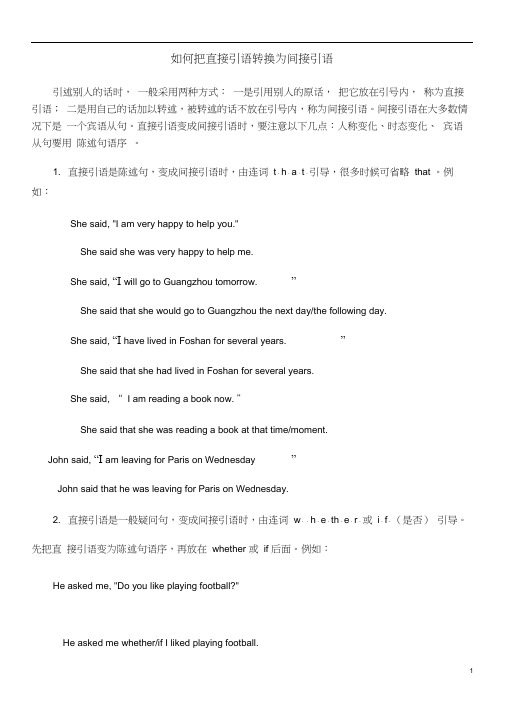
如何把直接引语转换为间接引语引述别人的话时,一般采用两种方式:一是引用别人的原话,把它放在引号内,称为直接引语;二是用自己的话加以转述,被转述的话不放在引号内,称为间接引语。
间接引语在大多数情况下是一个宾语从句。
直接引语变成间接引语时,要注意以下几点:人称变化、时态变化、宾语从句要用陈述句语序。
1. 直接引语是陈述句,变成间接引语时,由连词t.h.a.t.引导,很多时候可省略that 。
例如:She said, "I am very happy to help you."She said she was very happy to help me.She said, “I will go to Guangzhou tomorrow. ”She said that she would go to Guangzhou the next day/the following day.She said, “I have lived in Foshan for several years. ”She said that she had lived in Foshan for several years.She said, “ I am reading a book now. ”She said that she was reading a book at that time/moment.John said, “I am leaving for Paris on Wednesday ”John said that he was leaving for Paris on Wednesday.2. 直接引语是一般疑问句,变成间接引语时,由连词w..h.e.th.e.r.或i.f.(是否)引导。
先把直接引语变为陈述句语序,再放在whether 或if 后面。
例如:He asked me, "Do you like playing football?"He asked me whether/if I liked playing football.He asked Mary, “Will you come to my birthday party?You will come to my birthday party.He asked Mary whether/if she would come to his birthday party.注意:大多数情况下,if 和whether 可以互换,但后有or not, 或在动词不定式前,或放在介词后作连接词时,一般只用whether 。
新概念英语第一册第133135课语法直引变间引
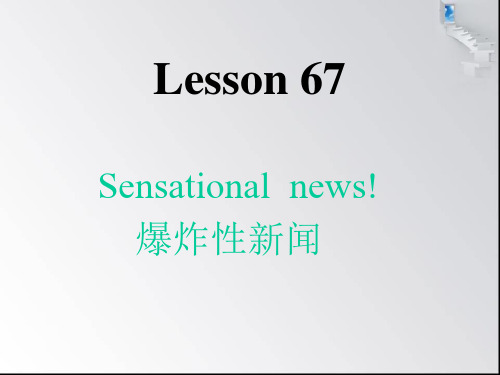
一般疑问句
用连词whether或if引导,原主句中谓语动词say 要改为ask ,语序要变为陈述语序
• He said, “Do you have any difficulty with pronunciation?”
train. • “Is he all right?”They cried out. • They cried out whether he was all right.
直接变间语中,要注意情太动词的变化 can – could
can’t – couldn’t will – would may – might
• You look great in the mink coat. • 你穿那件貂皮大衣看起来棒极了。
• wonder [‘wʌndə] v.1.感到好奇
•
2.感到惊讶
• I wonder why.
• 我想知道为什么。
• She wonders at his rudeness.
• 她对他的无礼感到惊讶。
Summary:
reporter sensational
mink coat wonderቤተ መጻሕፍቲ ባይዱ
直接引语变间接引语
1)人称的变化 一随主,二随宾,三不变
口诀
说明
直接引语
间接引语
一 随 主
引号内的第一人 称变间引后与主 句主语的人称保 持一致
She said,“ I like She said that she
直接引语变间接引语可分为三大类:
1)直接引语为陈述句 2)直接引语为疑问句(一般疑问句、特殊 疑问句) 3)直接引语为祈使句
英语语法 直接引语和间接引语

直接引语和间接引语引用别人的话一般有两种方式,一种是直接引用别人的原话,并把它放在引号内,这叫 直接引语;另一种是用自己的话来转述别人的话,并且不能用引号,这就是间接引语。
间接 引语在许多情况下构成宾语从句。
“I want to buy a house in the country.” Jack said. 杰克说:“我想在乡下买座房子。
”(直接引语) Jack said that he wanted to buy a house in the country. 杰克他说他想在乡下买座房子。
(间接引语) 1. 直接引语变间接引语的七大变化 (1) 人称变化 下面有一句顺口溜“一随主,二随宾,第三人称不更新”。
① 一随主 是指在直接引语变间接引语时, 如果从句中的主语是第一人称或被第一人称所修饰。
从 句中的人称要按照主句中主语的人称变化。
She said. “My brother wants to go with me.” → She said her brother wanted to go with her. ② 二随宾 是指直接引语变间接引语时, 若从句中的主语及宾语是第二人称。
或被第二人称所修饰。
从句中的人称要跟引号外的主句的宾语一致。
如果引号外的主句没有宾语。
也可以用第一人 称。
He said to Kate. “How is your sister now?” → He asked Kate how her sister was then。
③ 第三人称不更新 是指直接引语变间接引语时,如果从句中的主语及宾语是第三人称或被第三人称所修 饰,从句中的人称一般不需要变化。
Mr. Smith said: “Jack is a good worker。
” →Mr. Smith said Jack was a good worker。
(2) 时态的变化 直接引语变为间接引语时, 若主句为过去时态, 变为间接引语的宾语从句通常要将时态 往后推一个。
陈述句,转述句,引述句,直接引语,间接引鱼的定义与转换

陈述句,转述句,引述句,直接引语,间接引鱼的定义与转换引述句与转述句的相互转换--------直接引语与间接引语的相互转换小学语文句型转换要求学生掌握的类型主要有三种:一是转换成“把”、“被”字句;二是陈述句与反问句的互换;三是直接引语转换成间接引语,在小学阶段通常叫做“换成转述句”。
一、直接引语变间接引语(引述句改转述句)1、直接引语(人物直接说的话,提示语后有冒号、引号)如:张童说:“我一定要坚持长跑锻炼。
”间接引语(转述别人的话,提示语后加逗号,去掉引号)如:张童说,他一定要坚持长跑锻炼。
注意:人称代词要变换2、有二个明显特点:一是标点符号的变化,还有一个是代词的变化。
标点符号的改变引述句改为转述句,冒号和引号要改为逗号。
转述句改引述句,要加上冒号和引号。
人称的变化第一人称:我、我们第二人称:你、你们第三人称:他、她、它、他们、它们、她们引述是直接引用别人的话,而转述则是转达别人说的话,因此,引述句改为转述句时,说话人即第一人称“ 我”要改为第三人称“ 他” 或“ 她”。
(人称代词、指示代词的变化)3.当引述内容涉及其他人称时的改法。
(1)、第二个人转述(转给第三个人)A对B说话,然后B转述给第三个人听①、妈妈对我说:“我明天还要去开会。
”妈妈对我说,她明天还要去开会。
②、爸爸对我说:“你要好好学习。
”爸爸对我说,让我好好学习。
(2)、第三个人转述(转给第四个人)A对B说话,然后C转述给第四个人听。
①、妈妈对爸爸说:“我明天要去开会。
”妈妈对爸爸说,她明天要去开会。
”②、军官对夜莺说:“要是路带对了,我就把这东西送给你。
”军官对夜莺说,要是路带对了,他就把这东西送给夜莺。
③、妈妈对爸爸说:“你去买点菜。
”妈妈对爸爸说,让爸爸去买点菜。
4.代词相应变化的分析(1)、第二个人转述(转给第三个人)中的人称代词的变化。
①、妈妈对我说:“我明天要去开会。
”改为:妈妈对我说,她明天要去开会。
②、妈妈对我说:“你要好好学习。
直接引语变为间接引语ppt课件

从使用情况来看,闭胸式的使用比较 广泛。 敞开式 盾构之 中有挤 压式盾 构、全 部敞开 式盾构 ,但在 近些年 的城市 地下工 程施工 中已很 少使用 ,在此 不再说 明。
For example:
For example: 1. "Open the door,please."She said.
She asked me to open the door.
2. It says,"No smoking here." It told us not to smoke there.
从使用情况来看,闭胸式的使用比较 广泛。 敞开式 盾构之 中有挤 压式盾 构、全 部敞开 式盾构 ,但在 近些年 的城市 地下工 程施工 中已很 少使用 ,在此 不再说 明。
时态的变化
当主句是过去时时,从句要得变为相应的过去时态, 变化规律如下:
一般现在时—— 一般过去时 一般过去时—— 过去完成时 一般将来时—— 过去将来时 现在进行时—— 过去进行时 现在完成时—— 过去完成时 过去完成时—— 过去完成时(时态不变) 过去进行时—— 过去进行时(时态不变)
从使用情ቤተ መጻሕፍቲ ባይዱ来看,闭胸式的使用比较 广泛。 敞开式 盾构之 中有挤 压式盾 构、全 部敞开 式盾构 ,但在 近些年 的城市 地下工 程施工 中已很 少使用 ,在此 不再说 明。
English teacher. 另外注意直接引语为复数,引述者主语为单数,间接引语主语相应变复
数。如: He said,“Are you interested in English?”→He asked me/us if I
直引变间引

C. how can I get to the library D. how I can get to the library
9. John asked me _______ to visit his uncle’s farm with him.
C. if she will be fit for the job D. what she will be fit for the job
5. Is Mr. Wu from Beijing? I don’t e come from B. from where does he come
He told me, “I am going toChangchuntomorrow.”他告诉我:“明天我打算去长春。”
“Where are you from?” asked Linda.“你来自哪里?”琳达问。
直接引语变间接引语的变化形式
1.人称代词和指示代词的变化
指示代词this和these通常变为that和those。人称代词也要根据情况做适当调整。从句中的第一人称多变为第三人称,第二人称根据情况改为第一人称或第三人称,第三人称不变。例如:
He said to me,“Your bike is broken.”她对我说:“你的自行车坏了。”
→He told me that my bike was broken.他对我说我的自行车坏了。
2.直接引语为一般疑问句
直接引语为一般疑问句,将直接引语变为由if /whether引导的宾语从句,句中时态、人称、指示代词、时间状语、地点状语等要做相应的变化。其语序为陈述语序,若直接引语的引述动词为say,应改为ask.例如:
直引变间引
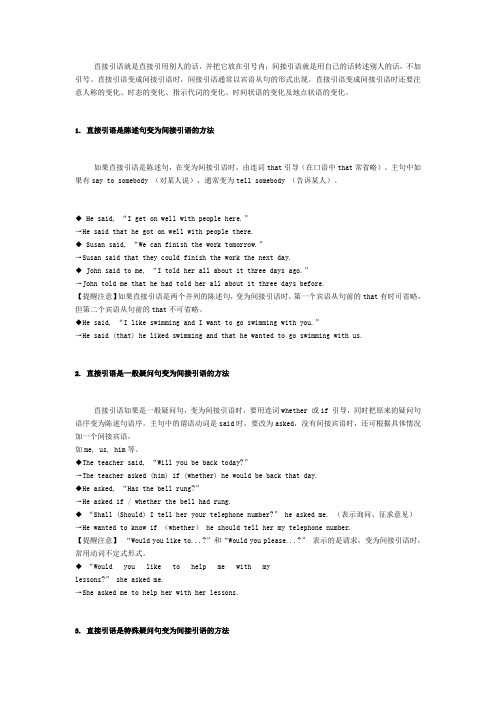
直接引语就是直接引用别人的话,并把它放在引号内;间接引语就是用自己的话转述别人的话,不加引号。
直接引语变成间接引语时,间接引语通常以宾语从句的形式出现。
直接引语变成间接引语时还要注意人称的变化、时态的变化、指示代词的变化、时间状语的变化及地点状语的变化。
1. 直接引语是陈述句变为间接引语的方法如果直接引语是陈述句,在变为间接引语时,由连词that引导(在口语中that常省略)。
主句中如果有say to somebody (对某人说),通常变为tell somebody (告诉某人)。
◆ He said, “I get on well with people here.”→He said that he got on well with people there.◆ Susan said, “We can finish the work tomorrow.”→Susan said that they could finish the work the next day.◆ John said to me, “I told her all about it three days ago.”→John told me that he had told her all about it three days before.【提醒注意】如果直接引语是两个并列的陈述句,变为间接引语时,第一个宾语从句前的that有时可省略,但第二个宾语从句前的that不可省略。
◆He said, “I like swimming and I want to go swimming with you.”→He said (that) he liked swimming and that he wa nted to go swimming with us.2. 直接引语是一般疑问句变为间接引语的方法直接引语如果是一般疑问句,变为间接引语时,要用连词whether 或if 引导,同时把原来的疑问句语序变为陈述句语序。
- 1、下载文档前请自行甄别文档内容的完整性,平台不提供额外的编辑、内容补充、找答案等附加服务。
- 2、"仅部分预览"的文档,不可在线预览部分如存在完整性等问题,可反馈申请退款(可完整预览的文档不适用该条件!)。
- 3、如文档侵犯您的权益,请联系客服反馈,我们会尽快为您处理(人工客服工作时间:9:00-18:30)。
左洪菊如何将直接引语改为间接引语
1.直接引语为陈述句,变为间接引语时常由连词that 引导,前面的动词动词用say,tell等
Eg. The teacher said ,“John, you must bring your book to the class.
Then teacher told John that he must bring his book to the class.
2.直接引语为一般疑问句,变为以whether ,if 等引导的宾语从句,前面的动词用
say ,ask ,wonder 等
Eg. He said to us, “Are you going away today?”
He asked us whether we were going away that day .
3.直接引语为特殊疑问句,变为间接引语时,其关联词用本身的疑问代词或疑问副词
Eg. “Who will help me finish the job” she asked .
She asked who would help her finish the job.
“What have you done” he asked.
He asked what I had done.
4.人称,时态,时间状语等其它方面的变化
时态:
1)主句为现在时或将来时态时,不变
Eg. He says, “I‟m tired.” He says he is tired.
He will say , “The boy was lazy.” He will tell you that the boy was lazy.
2)主句为过去时态时,间接引语的时态要做相应的变化
一般现在时----- 一般过去时
现在完成时------- 过去完成时
现在进行时-------- 过去进行时
一般过去式------- 过去完成时
现在完成进行时----- 过去完成进行时
过去进行时------- 过去完成进行时
Eg. He said ,“The rain was falling yesterday .”
He said that rain had been falling the day before .
时间状语的变化:
now--- then ago ---- before today --- that day tomorrow --- the next day / the following day yesterday ---the day before the day before yesterday ----two days before
the day after tomorrow --- two days later next week ---- the next week so far ---by then
this ---- that these --- those here---- there come ---- go
1.连词that 引导
2.人称的改变( 一随主、二随宾、三不变)
3.时态的变化(主句用现在时或将来时,从句可用任何时态;主句用过去时,从句用与过去
时相关的时态.)
4.如果直接引语是客观真理时,变为间接引语,一般现在时不改为一般过去时. 如:
The teacher said “ The earth goes round the sun .”→The teacher said that the earth goes round the sun.
1.He said , “ I like it very much .”He said that _____ liked it very much.
2.He said to me ,“ I‟ve left my book in your room .”
He told me that _______ had left _______ book in ______ room.
3.He said ,“ I …m using the knife.”
He told me that he ______ _______ the knife .
4.She said that , “ I have not heard from him since May .”
She said that _______ ________ __________ from him since May .
5.H e said , “ I saw her in the street .”
He said that he _______ ________ her in the street.
6.He said , “ I had finished my homework before supper .
He said that he _______ _______ his homework before supper.
7.Zhou Lan said , “ I‟ll do it after class.”
Zhou Lan said that he _______ _______it after class .
8.He said , “ Light travels much fast than sound .” He said that ____ ____ much faster than sound .
9.Our geography teacher said to us , “ The sun rises in the east and it sets in the west .”
Our geography teacher told us that ________________________________________.
10.My history teacher taught us , “The People‟s Republic of China was founded in 1949.”
My history teacher taught us that ___________________________________________.
11.He said , “ These books are mine .” He said that ____ books were his.
12.He said , “ My sister was here three days ago .”
He said that his sister had been there three days ________ .
13.She said , “ I went there yesterday .”
She said that she had gone there _______ _______ _______ .
14.She said , “ I‟ll go there tomorrow .”
She said that she would go there ______ ______ _____ .
15.She said , “ I came here to see the doctor the day before yesterday .”
She said that she _________ ________ __________ to see the doctor_______ ________ _______.
16.She said, “I will come here this evening .”She said that she would _______ ______ ______
evening
17.He said , “ I am going there tomorrow .” He said that he was going ________ _________ ______.。
